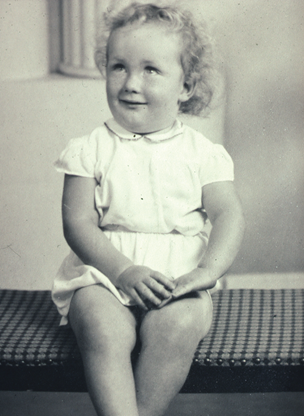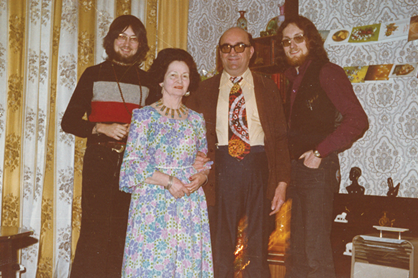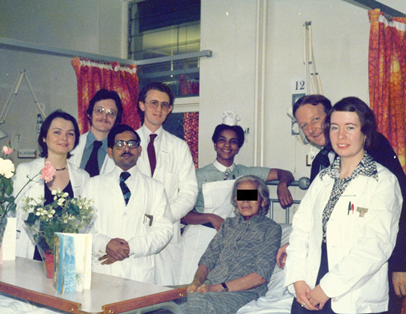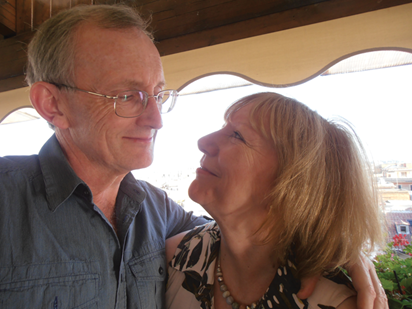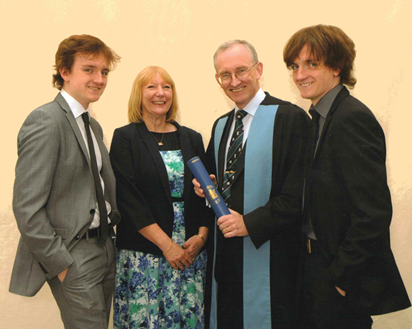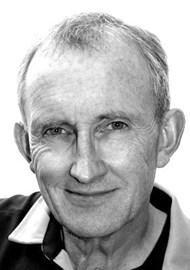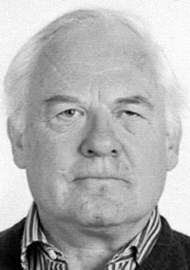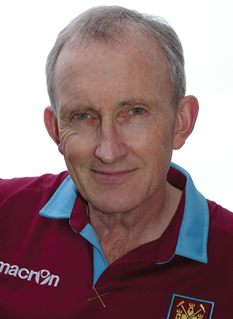
Liam Flood.
With a name such as Liam you must have some ‘Irish blood’? Where does your family come from? Tell us more? (What did your old man / mum do?)
Some Irish blood? Those who know me well would assure you I have nothing but and the passport to prove it. A pair of forceps dragged me screaming into Waterford City, in the year the Queen was crowned, Everest conquered and the two sides in Korea decided to cease fire. Mom and Dad came from far from wealthy stock, Mom from Tipperary farmers and Dad was the black sheep of the Waterford side. Dad pulled pints in a pub for most of his working life, but took us across the Irish Sea when I was four-months-old. Like so many immigrants, my parents valued education and wanted better for their offspring. The UK then (repeat, then) offered incredible opportunities. A full student grant, no tuition fees and a London Medical school that took you with B, B and D grades at A level, all for a lad with an Irish passport!
You are a twin son, identical or ‘odd’? What career did he pursue? (any other children?)
A twin brother? It would not surprise me in the least, but the only other one my Dad acknowledged is Sean, two years younger. You’ll see from the photo that we were indeed ‘alike’, but he disappeared off to India, then Morocco and finally Amsterdam. He is now a primary school headmaster in central London and a paragon of respectability, indeed a pillar of the community.
Baby Liam.
What influenced you to pursue a career in medicine? More so ORL-HNS? (Where and when did you graduate?)
History was always the plan, it remains a lifelong interest and I hope I have not unduly influenced my twin lads, currently at Newcastle doing History and Ancient History (and doing well!). Unlike them, I guess, I considered job prospects in the late ‘60s. University College Hospital (UCH) was the only place that would tolerate my sartorial style I feared, but, strangely, even conservative, rugger-playing, Barts offered me a place. The early years at medical school are a blur (well it was 1971), with tales best not told. My biggest regret is attending, yet totally missing and with no recollection of, two Grateful Dead concerts in 1971 and 1973. It is too late now, as too many of the members have lived up to their name.
Why our noble speciality?
Like many things in my life, pure chance and good fortune. Seeking my first surgical pre-registration house post, I put in for six months ENT at UCH as an insurance job, but was the only one to attend for interview. I can still see Graham Fraser (bless him) across that table, telling me they needed an immediate acceptance from me, or they must re-advertise. OK, I thought, better chance of a night’s sleep than in general surgery, useful skills, why not? Within a few months I was doing my own operating lists, solo, and hands-on work at that early stage just captivated me.
(L-R): Sean (brother), mom, dad (what a tie) and Liam in 1973.
Most of your undergraduate/postgraduate career was in London?
What career were you plotting at that time? Not sure I have ever plotted anything in my life. I micromanage obsessionally, but don’t ‘do’ the big picture. Things tend to happen to me and I often reflect, as a result, ‘what a long strange trip it’s been’ (John Watkinson will recognise that and it is my chosen epitaph). Staying around London was the easy option, turning up at home every few weeks hungry and with a pile of laundry. I do think about what my folks put up with…
We met in the late 1970s and we were ‘on course’ to be a head and neck surgeons. What happened?
Well back then our training did make us totipotent, if not omnipotent, and, for a two year gap, I was the only head and neck surgeon in ENT in the ‘Boro’ (Middlebrough)’. Luckily, I had Brian Bingham as my senior registrar and, whilst I would start every major resection, as soon as it got tricky I would suggest the next bit was good for his training! Early house officer experience in the head and neck unit at the Marsden, followed by six months with Professor Donald Harrison at Gray’s Inn Road, was quite a start in cancer surgery. After that I went back to UCH, but won a TWJ fellowship to Ann Arbor, Michigan, USA under Prof Malcolm Graham. A mind expanding experience, especially with a TWA open roving ticket, valid for three months, anywhere in the USA and credit cards that I worried about on return! Martin Bailey had preceded me and all there agreed that we were two very different characters, but they really could not fathom either of us.
(L-R): House surgeon, Liam, Govind Kaneogonkar (Senior Reg and dad to a current
ENT consultant, Rahul), John Curotta (now in Australia), Graham Fraser, house surgeon.
You were appointed to Middlesbrough in 1985 and ‘became an otologist’? And remained such ‘ever since’?
Well done, you spelt it right. Most folk add an ‘o’ to Middlesbrough. Everyone had me earmarked for a particular London job, but living in the country, driving 15 minutes and 10 miles to work without passing a single set of traffic lights, swapping a London pied-a-terre for a North Yorkshire estate appealed more. Four wheel drive can be a winter help and spring lambs calling for their moms past midnight soon lose their charm though. The Boro unit was a gem for its time. A senior registrar from Dundee, two registrars who were all ours, an old (very old) District General Hospital (DGH) that had been deserted by all but ENT and Eyes, so masses of space. Vasant Oswal is well known to all readers of this journal and had introduced not just laser surgery, but an international course, that has now been running for 30 years. We had the Malaysian contacts that took me twice to Kuala Lumpur to run training courses and made me lasting friendships. The Boro unit has grown from four to seven consultants and is now in the newer, safer, but somehow more impersonal monster that is James Cooks (a place that employs nearly 10% of Middlesbrough’s population). Otology and a microscope is my first love, but it is funny how my practice accidentally expanded into surgery of sleep disordered breathing and, since going part-time, my one regular weekly clinic is an administration nightmare, the dreaded ‘two week wait clinic’; seeing folk with fears of head and neck malignancy, but in practice largely features of catarrh, globus, reflux and atypical facial pain. I handle the fibre optic endoscope more than the auroscope these days.
During your career you got involved in teaching, writing and examining? How and why this path?
Why? I do recall one of my trainers, watching me struggle with a stapes piston, exclaim “Those who can, do, those who can’t, teach”. However, I’d like to think that doing something more than the routine work kept me going all these years, without ever getting bored. I am still conscious of the privileged training chances I got and, a bit of a Bolshevik still, want to pay something back. The work can be fascinating, especially my current role with National Institute for Health and Care Excellence (NICE), on the Interventional Procedures Panel. The 0608 train to London once-a-month, waiting on an open uncovered platform, on the edge of the North York Moors, in a January blizzard, can be less appealing though.
How? Find the time, make it. Joining the Specialty Advisory Committee at the Royal College of Surgeons London (SAC), the Intercollegiate Exam Board, the Editorial Boards of both The Journal of Laryngology & Otology (JLO) and Clinical otolaryngology (Clin Oto), whilst claiming to be working 50 hours a week for the National Health Service (NHS) salary, I knew something had to give. In 2005 I packed up all private practice and, of course, hitting 60 in 2013, I retired, to return part-time and much the poorer, but happier. There is no such thing as downtime. If the theatre turnaround is (always is) at a snail’s pace, I can still be writing a book review, playing with Powerpoint or working on the trainee’s Intercollegiate Surgical Curriculum Programme (ISCP). Do not get me started on time management amongst trainees nowadays. Folk these days… they don’t know they are born. Eeeh! We had it different. In my day I’d write a paper before coming to work, be beaten black and blue on the ward round, left alone to do a list including a stapedectomy on the only hearing ear of a barrister’s daughter and I had it lucky…
You come across as a practical, dedicated and well-read clinician? How was that achieved?
You’ll know this one, Pat. It’s called the ‘Blarney’. Profound ignorance of any subject has never stopped me from speaking with great authority. I have thousands of old 35mm slides and a busy Minolta digitiser attached to my PC. I carry the equivalent of 50 carousels on a little stick attached to my key ring everywhere I go; that is how to come across as the intellectual that you suggest.
The ultimate accolade must be to be interviewed for ENT and audiology news. I looked back through those similarly chosen in recent editions and do feel I must be part of the great and good, to be in such company.
Your contributions to ENT-UK Newsletter may be considered ‘risqué’ to say the least? Why this approach? Has anybody taken umbradge? Taken retaliatory action?
I thought how restrained I had been, but did always feel the bulletin needed a little lightening up. You do have to draw the line somewhere, but no one said it has to be a straight line, after all. What did I write? Jim Fairley forgave me for that joke that I could not repeat anywhere, but which was printed back then. Tony Narula is now much slimmer and fitter and so never minds me comparing his earlier build to that of our taxi driver, with obvious sleep apnoea, who took the family overnight from Rome to Paris during the volcano chaos. I really did deliver that talk to the Royal Society of Medicine (RSM) with a very important zip undone throughout and faced the dilemma, with two slides to go, as to whether to acknowledge this and adjust the problem, or instead avoid drawing attention to my plight. An article on how to lose your merit award, through complacency in filling in the form, or that one about several senior consultants suddenly not even licensed to practise did get some responses, of panic! I did once ask for publication of a list of ENT UK members broken down by age and sex (deliberately leaving out the comma), but no-one fell for that.
Liam and ‘the long suffering Elaine’ in Rome.
(L-R) Alec, Elaine, Liam and Iain at Liam’s award of FRCSI Ad Eundem Dublin in 2013.
You are a family man – three boys and a granddaughter – how do you ‘fit everything in?’
Not sure I always did. Kevin Gibbin memorably often describes me as a serial monogamist and there was a time when I could meet three ladies claiming to be Mrs Flood, all on the same day. One brought me coffee at the Nuffield clinic, one was the theatre manager at the big hospital and the current Mrs Flood was home, with twin newborn babies, cursing me. Tim is about to turn 33 and now has two daughters; Alec and Iain are identical genetically, but could not be more different and Elaine has stuck with me for 25 years now, so I do seem to be in a stable phase. Twins, coming that bit later in life, everyone assumes as from ‘an assisted conception’. Far, far from it, I always insist, although a bottle of Glenmorangie in Culloden House may have had something to do with it.
Now that you have stepped down from ‘full-time’ employment, working a ‘shared-job’ – what’s the plan? How long before you ‘turn-your-back’ on ORL-HNS and ‘head for the open seas’ (Cyprus)?
Poor Maurice Hawthorne took the short straw in our job share, a 60/40 split. Guess which of us took the 40% and dropped all on call. I cannot swim (or ride a push bike) and have not been in any kind of ship like-vessel in many years, so joining Andrew Swift off the Orkneys or Johnny Osborne’s crew to sail around the world does not appeal. I’ll rely on Frank Whittle’s jet engine to get me to Sorrento in May and Dubrovnik in July. Eurostar will get us back to Brussels, as I really must walk from Wavre to Plancenoit, next month (and if you know your history you’ll know why). Elaine does not ‘do’ muddy battlefields and I am not sure a 10 mile walk is the lads’ thing either. Just this morning I got tickets for the next West Ham away game and I’ll travel the North of England as a loyal supporter. The working deal is probably three years and pack up completely by then. There is an art to knowing when to go, but, till then, enough to do with JLO, NICE, Clin Oto, Annals RCS, Ombudsman, Masterclass, FRCS Revision Course… you get the picture.
Any advice for the ‘younger ones’ in ORL-HNS?
You said 2000 words maximum! UK ENT is threatened by the realisation that the NHS is not funded by a bottomless resource. Many of our procedures are suddenly of ‘limited effectiveness’ (presumably those, not so listed, are of infinite effectiveness?). The prospects here are not as rosy as those my contemporaries faced and are in marked contrast to the world picture, but let’s be upbeat. New technologies, if affordable, will transform our work. I well recall Mike Rothera using the first flexible nasendoscope that we had ever seen at UCH and he suggested that it might yet actually be of some limited use in the clinic. To the trainees, goes the message that curriculum vitae (CV) enhancement is everything. You will be in competition for that plum job and you need to be planning at least two years ahead (i.e. now) for fellowships, higher degrees, research. To those just in post, I say put something back in exchange for everything that others did for you. It is like Captain Miller to Matt Damon on the Bridge at the end of the film... ‘Earn this’.
Interview conducted by Prof Patrick J Bradley.

